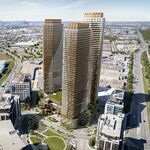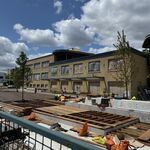I hate ghettos
Culture, food and groceries are all fine.
But never have I or any of my friends actually felt at home in Chinatown. It's too foreign to be "home" and, there, I've felt like a foreigner in my own country. It's nice to be able to go to a "foreign" place like Chinatown or Little India once in a while, take in the local flavour and play tourist, but I could never live there (nor in any other ghetto) because I would feel out of place and -- frankly -- I feel that I would not be welcome to move into Chinatown, nor in many other places in Toronto.
Xenophobia, you say? Perhaps, but I don't think so. I wasn't born or raised xenophobic, that's for sure. And, given that I am ethnic myself and never lived in a ghetto of my own ethnicity, it's unlikely that I would be fearful of "others" because I was always surrounded by "others". In any case, xenophobia is reciprocal. In Chinatown and certain other pockets of East Asian immigrants, I've distinctly felt treated as an "outsider", the colour of whose money was never quite green enough to merit civility and basic politeness. The same has also been true in old Quebec and the southern U.S. I must say this is not a universal occurence: I've been made to feel quite welcome as a customer in "ethnic" businesses and restaurants throughout the city and indeed throughout the country. My favourite convenience store is run by a wonderful Korean family. My least favourite fruit stand is not in Chinatown but in my own neighbourhood. It's my least favourite because it's so unwelcoming: no one in the store save the cashiers speaks English (and not well at that) and customers are served with the utmost lack of attentiveness and respect. I figure no one in that store wants to be there; they may all be recent immigrants whose career plans never included working in a fruit stand for minimum wage (I hope they get at least that, but I suspect this is not always true). I also have other beefs with their produce and the way they handle their garbage, but that's for another conversation. In Chinatown itself, I suspect it's simply complacency.
So what's my point? If old Chinatown is to survive as a Chinatown, it must stop depending on Chinese/Vietnamese clients and cater to non-Asians and make them feel welcome. It's entirely natural for well-to-do ex-settlers to seek better/larger/cheaper digs, depopulate the traditional ghettos and only occasionally return.
What I really don't like are the new ghettos in Scarborough and Markham. I simply don't feel any attachment and extend no welcome to people who don't reciprocate, and I simply get no warmth from the thought that people are flocking to this country who have no intention of becoming part of the country, people who have absolutely zero connection with any other part of the country other than with other urban ghettos of their own ethnicity. Yes it's natural for people to assemble, to be with others who speak the same language, practice the same religion, eat the same foods, to feel secure, to get help, etc. However, the fundamental question for every immigrant remains: Why come to another country, if all you will do is try to re-create your homeland and avoid everyone else (except to take their money)? In that light, the concentration of East Asians in NE T.O. is a very bad sign. Worse is a recent Muslim-only neighbourhood in Vaughan, and I'm still shaking my head at that.
I therefore see the perceived decline of Chinatown as a good sign and I hope local business-people will take the opportunity to seek out new clientèle while keeping the flavour alive.




